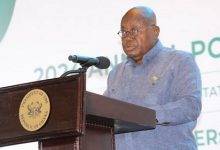
The First Deputy Governor of the Bank of Ghana (BoG), Dr Maxwell Opoku-Afari has stated that though the COVID-19 pandemic has presented enormous challenges to the Ghanaian economy, it has also become a potent catalyst for digitisation.
He said the novel coronavirus pandemic had helped push the frontiers of digitisation and adoption and uptake of digital services, thereby promoting financial inclusion of the unbanked and underserved communities.
Dr Opoku-Afari said this in Accra on Tuesday, when he delivered the keynote address at the Mobile Technology for Development Conference.
Organised by the Telecommunications Chamber and Financial Inclusion Forum, it was on the theme “The Role of Financial Inclusion in a COVID-19.”
Dr Opoku-Afari stressed the need for stakeholder collaboration to promote digitisation and financial inclusion.
“Let us continue to work together as stakeholders to advance financial inclusion by exploring innovative digital financial services solutions that keep us safe and create economic growth opportunities to improve livelihoods,” he said.
Dr Opoku-Afari explained that the COVID-19 pandemic had tested the effectiveness and resilience of Ghana’s financial inclusion efforts.
“In general, the strategies and the specific COVID-19 interventions have proven to be effective. Notwithstanding, the crisis has exposed some gaps in policies and underscored the need to revise strategies to improve their usefulness,” he said, stressing that “in response, the Bank has implemented a number of policies to accelerate digital financial inclusion in order to reduce the
impact of COVID-19 on individuals, businesses and governments.”
Dr Opoku-Afari said the policies included a tiered license categories for payment service providers, Merchant Account Categorisation, Ghana Quick Response Code, crowdfunding and merchant account categorisation.
The Second Deputy Governor particularly on the merchant account categorisation said “In spite of the 14 per cent increase in active merchants, it was observed that the requirements for onboarding merchants was steep, onerous and unfriendly to small and medium enterprises, which constitute about 90 per cent of businesses in the country. This situation limits the feasible use cases of digital payment instruments for paying for goods and services.”
He explained that merchants in the Small and Medium Enterprises category suffered on account of their inability to meet the requirements for establishing merchant accounts.
“As a consequence, a three tiered merchant account framework was published by the Bank for a more inclusive digital payment acceptance,” he said.
The Second Deputy Governor indicated that the COVID-19 policies introduced by the BoG and the government yielded positive results.
He said a review of mobile money transactional data following implementation of the Bank’s COVID-19 financial sector policies indicated significant uptake of digital financial services, it was noted that inactive customers activated their wallets while existing users increased usage of wallets.
Dr Opoku-Afari, said for instance, activation of dormant wallets increased from an average of 71,984 per week before the measures to 84,025 per week significantly, the simplified onboarding requirements which leveraged GSM registration data contributed to new KYC accounts of 208,120. “Average wallet balances increased by about 27 per cent during the intervening period. Furthermore, the number of active merchants recorded a growth of 14 per cent, and reflected the growing digital payment acceptance by merchants.”
The Second Deputy, however, noted that although interoperability transactions increased during the lockdown, it was not remarkable compared with on-network peer to peer transaction, stating that “this development was attributed to price sensitivity in mobile transactions.
Dr Opoku-Afari commended the organisers for the programme, saying the event was taking place at an unprecedented time in recent global history, and provides for stock taking of the country’s digitisation efforts.
BY KINGSLEY ASARE






